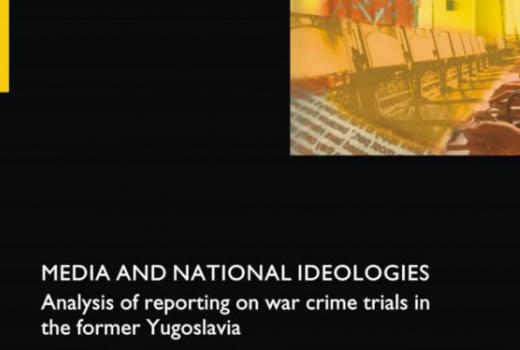Media and National Ideologies: Analysis of reporting on war crime trials in the former Yugoslavia

Media and National Ideologies: Analysis of reporting on war crime trials in the former Yugoslavia
Zala Volčič i Amer Džihana
Publisher:
Mediacentar Sarajevo
2011
Collection of research papers focusing on national ideologies and media in Bosnia and Herzegovina, Serbia and Croatia. Edited by Zala Volčič and Amer Džihana.
The case of the former Yugoslav states provides a powerful example of an arena in which the mass media continue to play a crucial role in creating and representing (ethno) national identities. (Ethno) national identities retain important ideological functions in the region. When during the end of the 1980s and 1990s, the nationalisms of all the republics of the former Yugoslavia escalated, each community first re-activated or re-created its national media in order to reinforce and re-invent a sense of national identity and difference.
This collection is an attempt to offer some explorations of the role played by nationalism in media coverage in three countries: Croatia, Bosnia & Herzegovina, and Serbia. Broadly, we are interested in exploring how the traumatic past of the Yugoslav wars has been represented in the media and how media representations of contemporary political processes relate to the traumatic past. Specifically, we focus on media representations of the highly publicized war crime trials. For media outlets and political institutions alike, coverage of the trials of the crimes committed during the Yugoslav wars is an important way of demonstrating that, at least symbolically, there has been a break with the former regimes. The point is not only to judge the perpetrators of the crimes, but to transform the overall political paradigm. Thus, it is crucial to explore how the war trials are represented in the media, and how the trauma they represent has been incorporated into public memory. Are there historical consequences to how a society deals with the memories of war trauma? What is the role of the media in forming memories? What are the communication patterns of the media in covering the war trials? What can be done to address the dilemmas of memory that are likely to shape the future in the former Yugoslav region? The focus on the above questions is motivated by the broader goal of contributing to the study of changes in the structures and relations of media, journalism, nation, ethnicity, memory, power, and reconciliation after the Yugoslav wars.
The project’s goal is to draw upon the work of scholarship in the region in order to reflect a range of perspectives and intellectual traditions in the former Yugoslavia. Each of the five chapters represents an original methodological approach to exploring the following questions:
a) What are the patterns of representation of war crime trials which reveal ideological positioning of the media?
b) Do media reproduce the ethno-national fragmentation of the audience?
c) Are some media/some countries more inclined to reproduce national ideologies than others?
d) Is it possible to establish whether different types of media ownership and regulation coincide with different patterns of nationalist discourse in the media? For example, do media owned by foreign corporations differ in this respect from domestically owned media organizations?
e) What is the relationship between the ideology of ethno-national elites and media reporting?
f) What is the role of the commodification of news and information in reporting on war crime trials?
g) How do the forms of nationalist discourse presented in routine media coverage of domestic events differ from forms of nationalist discourse present in the media coverage of exceptional events such as major war crime trials?
This book is the result of a two-year regional study entitled ‘(Un)covering Karadžić: a case study on media (re)production of national ideologies through war crimes coverage in the former Yugoslavia’ realized with financial support from the Swiss Regional Research Promotion Programme in the Western Balkans - RRPP (SDC - Swiss Agency for Development and Cooperation and the Univeristy of Fribourg).
The book is available in English and local languages at Mediacentar Sarajevo, Kolodvorska 3, 71000 Sarajevo, Bosnia and Herzegovina, and will soon be available in English as well.




